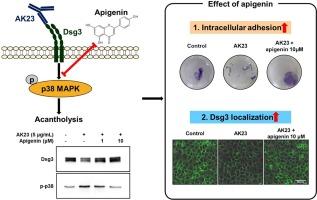Inhibitory effect of apigenin on AK23-induced desmoglein3 depletion in HaCaT cell model of pemphigus vulgaris via suppression of p38 MAPK phosphorylation
IF 3.8
2区 农林科学
Q2 FOOD SCIENCE & TECHNOLOGY
引用次数: 0
Abstract
This study aimed to investigate the effect of apigenin, a flavonoid widely distributed in plants, on AK23-induced desmoglein3 (Dsg3) depletion in pemphigus vulgaris (PV) model using HaCaT cells. Dispase-based dissociation assay showed that the number of cell fragments, which increased compared to the control group due to AK23 treatment, dramatically decreased when HaCaT cells were incubated with AK23 and apigenin. The continuous linear fluorescence intensity of Dsg3 between cells was decreased in the AK23 group, but the treatment of apigenin recovered the fluorescent distribution of Dsg3. Moreover, the addition of apigenin up-regulated the Dsg3 protein expression in AK23-treated HaCaT cells. The phosphorylation level of p38 mitogen-activated protein kinase (MAPK) induced by the AK23 was down-regulated by apigenin. In conclusion, apigenin attenuated AK23-mediated Dsg3 depletion by suppressing the p38 pathway in the PV cell model. Therefore, apigenin could be a functional food material for ameliorating PV.

芹菜素通过抑制 p38 MAPK 磷酸化对 AK23 诱导的寻常天疱疮 HaCaT 细胞模型中去酪氨酸蛋白 3 的消耗具有抑制作用
本研究旨在利用 HaCaT 细胞研究芹菜素(一种广泛分布于植物中的类黄酮)对 AK23 诱导的寻常天疱疮(PV)模型中去酪氨酸蛋白 3(Dsg3)耗竭的影响。基于解离酶的解离试验表明,与对照组相比,AK23 处理后细胞碎片数量增加,而当 HaCaT 细胞与 AK23 和芹菜素一起孵育时,细胞碎片数量急剧下降。AK23 组细胞间 Dsg3 的连续线性荧光强度降低,但芹菜素处理后 Dsg3 的荧光分布恢复。此外,芹菜素还能上调 AK23 处理的 HaCaT 细胞中 Dsg3 蛋白的表达。芹菜素降低了 AK23 诱导的 p38 丝裂原活化蛋白激酶(MAPK)的磷酸化水平。总之,芹菜素通过抑制光伏细胞模型中的 p38 通路,减轻了 AK23 介导的 Dsg3 消耗。因此,芹菜素可作为一种功能性食品材料用于改善黄斑病变。
本文章由计算机程序翻译,如有差异,请以英文原文为准。
求助全文
约1分钟内获得全文
求助全文
来源期刊

Journal of Functional Foods
FOOD SCIENCE & TECHNOLOGY-
CiteScore
9.60
自引率
1.80%
发文量
428
审稿时长
76 days
期刊介绍:
Journal of Functional Foods continues with the same aims and scope, editorial team, submission system and rigorous peer review. We give authors the possibility to publish their top-quality papers in a well-established leading journal in the food and nutrition fields. The Journal will keep its rigorous criteria to screen high impact research addressing relevant scientific topics and performed by sound methodologies.
The Journal of Functional Foods aims to bring together the results of fundamental and applied research into healthy foods and biologically active food ingredients.
The Journal is centered in the specific area at the boundaries among food technology, nutrition and health welcoming papers having a good interdisciplinary approach. The Journal will cover the fields of plant bioactives; dietary fibre, probiotics; functional lipids; bioactive peptides; vitamins, minerals and botanicals and other dietary supplements. Nutritional and technological aspects related to the development of functional foods and beverages are of core interest to the journal. Experimental works dealing with food digestion, bioavailability of food bioactives and on the mechanisms by which foods and their components are able to modulate physiological parameters connected with disease prevention are of particular interest as well as those dealing with personalized nutrition and nutritional needs in pathological subjects.
 求助内容:
求助内容: 应助结果提醒方式:
应助结果提醒方式:


